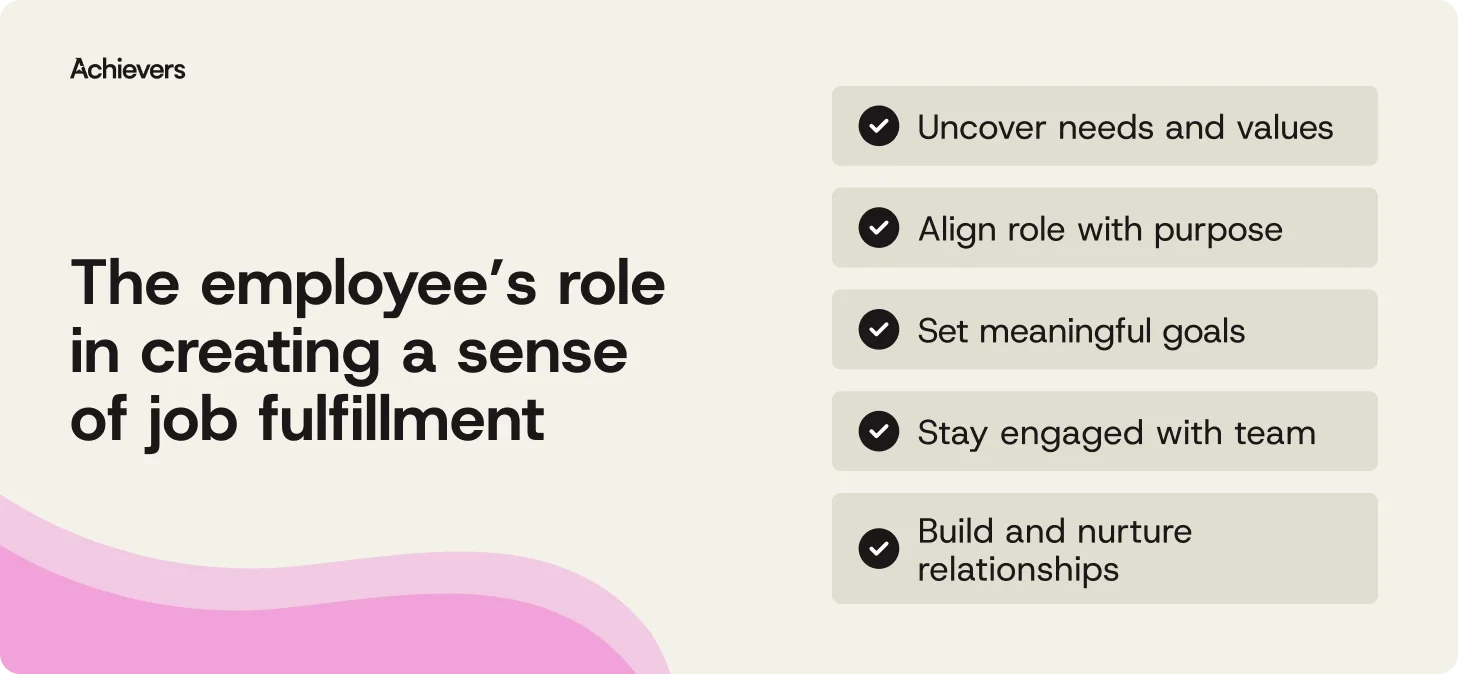Table of contents
Create a culture that means business™
Schedule a demo with an Achievers solution expert today.
Employees need fulfillment at work to not only thrive, but stay engaged. For employers, creating and a sense of fulfillment extends beyond basic job satisfaction — it involves creating an environment where individuals are happy at work and experience purpose and growth. Sounds like a tall order, but there are some easy-to-implement ways that you can get started today.
This guide explores the elements that drive fulfillment at work and offers practical strategies employers can use to cultivate a more meaningful and rewarding workplace for employees. Let’s dig in.
What is job fulfillment?
First off, what are we talking about? Job fulfillment is the level of employee satisfaction and happiness an individual derives from their job. It involves aligning one’s personal values and career goals with their day-to-day work, leading to a sense of purpose and motivation.
Why do people feel unfulfilled at work?
People feel unfulfilled at work for a variety of reasons, including misalignment between their roles and personal values, lack of growth opportunities, or a disconnection with the company’s mission. Recognizing and understanding these factors is crucial in addressing the root causes of unfulfillment in the workplace and the disengagement that results from it.
Why does job fulfillment matter?
Job fulfillment matters because when employees feel a sense of fulfillment, they are likely to be more satisfied, engaged, and productive. This not only leads them to perform at a higher level, it contributes to a more positive organizational culture.
6 strategies to help employees achieve job fulfillment
As an employer, fostering job fulfillment should be near, if not at, the top of your to-do list. It’s essential to enhancing employee engagement, increasing productivity, and retaining top talent. Here are six effective strategies you can begin to implement today to help employees achieve job fulfillment and create a more satisfying and motivating workplace:
1. Encourage professional growth
Offer opportunities for upskilling, mentorship, and career advancement. Support your team with training programs, workshops, or tuition assistance, helping them build relevant skills and achieve long-term career aspirations.
2. Recognize achievements
Regularly acknowledge employee accomplishments — both big and small. Celebrate milestones through public recognitions, awards, and rewards to reinforce their value and contributions to organizational success.
3. Foster open communication
Create a workplace culture where feedback is frequent, constructive, and flows both ways. Encourage team members to share their ideas, concerns, and suggestions, and then be sure to acknowledge or action the feedback to demonstrate that their voices matter.
4. Promote work-life balance
Offer flexible scheduling, hybrid work options, or additional paid time off when possible. Supporting your team’s well-being and balancing their personal and professional responsibilities increases satisfaction and loyalty.
5. Empower autonomy
Allow employees greater control over their tasks and decision-making. Trust your team to manage their workload and contribute new approaches, boosting motivation and innovation.
6. Align values and purpose
Define your company’s mission and values clearly, and connect daily tasks to these broader goals. When employees see their work as meaningful, they are more likely to experience deeper job fulfillment.
By prioritizing these strategies, you can cultivate a workplace environment that empowers your team and results in higher levels of satisfaction and organizational performance.
Actions your employees can take
It’s not all on you. In addition to the efforts you make as an employer, your employees can play an active role in creating their own sense of fulfillment at work too. Here are a few ways employees can become more fulfilled at work:

1. Help them identify their needs and values
Encourage your employees to identify what genuinely matters to them in their careers by asking them to reflect on their core values, professional interests, and long-term aspirations. You can prompt self-reflection with questions like:
2. Support them in aligning their role with their purpose
Once they’ve identified their needs, the employee and their manager can work towards aligning their current role with their sense of purpose as well as the organization’s. This could look like seeing out projects that resonate with their values or discussing role adjustments with their manager to better fit their strengths and interests.
3. Teach them to set meaningful goals
Setting clear, achievable goals can provide direction and motivation. Managers can ask their teams to break down their long-term career aspirations into smaller, actionable steps. Setting up regular 1:1s to review and adjust these goals will ensure they remain relevant and challenging.
4. Encourage them to participate in a positive workplace culture
A supportive and positive workplace culture is essential for fulfillment. When employees stay engaged with their team, participate in company events, and contribute to a culture of recognition and appreciation, a sense of fulfillment follows. This not only enhances their own experience — it also fosters a sense of belonging and community company-wide.
5. Provide opportunities for professional growth
Continuous learning and development are key to maintaining job fulfillment. Provide your people with a channel to seek out opportunities to upskill or reskill, whether through formal training, mentorship, or self-directed learning. This not only enhances their capabilities, but also keeps the work engaging and dynamic.
6. Foster strong relationships
Building strong relationships with colleagues significantly impacts an employee’s sense of fulfillment. Encourage collaboration within and across teams, offer support, and provide feedback. Team building activities like office lunches, team challenges unrelated to work, or after work group activities can also help employees connect as people, not just colleagues. These interactions lead to a more cohesive and enjoyable work environment for everyone.
The role of company culture in job fulfillment
Actions that are recognized are repeated. Building a company culture that values and prioritizes consistent and meaningful recognition is at the core of creating a sense of job fulfillment for employees.
Creating a culture of recognition
Employee recognition is a powerful tool in driving employee engagement and fulfillment. Companies that prioritize recognition and celebrate success create an environment where employees feel valued and motivated. Implementing platforms like Achievers’ Recognize™ and Reward™ can help cultivate this culture.
Encouraging employee engagement
Engaged employees are more likely to experience job fulfillment. Encourage open communication, provide regular feedback, and involve employees in decision-making processes. This empowers them to take ownership of their roles and contribute meaningfully to the organization.
Achieving job fulfillment with Achievers
As an employer, fostering fulfillment among your workforce is essential for driving engagement, productivity, and retention. With Achievers, you have the tools and support needed to create a workplace where employees feel recognized, valued, and connected to your company’s mission. Empower your teams by effectively acknowledging their accomplishments, promoting a positive culture, and providing meaningful opportunities for growth.
At Achievers, we believe that recognition is the single most effective way to transform company culture and drive employee fulfillment. Our employee engagement platform is designed to empower employees, managers, and HR leaders to achieve their full potential. With a 93% activation rate, our platform is proven to deliver measurable business results.
We help organizations cultivate an environment where every employee is inspired to contribute their best.
Get started today
As an employer, navigating the complexities of today’s workforce landscape requires thoughtful strategies and reliable partners. By understanding key concepts and leveraging the right resources, you can confidently manage your teams, ensure compliance, and foster a supportive work environment. Empower your organization to adapt and thrive by staying informed and choosing solutions that align with your business goals.
Ready to get started? Explore how Achievers can help you drive engagement, shape behaviors, and drive created job fulfillment. Plus, discover the tangible business outcomes of our platform and see how it can simplify your complex challenges, allowing you to focus on the human element of your work.
Creating job fulfillment FAQs
Key insights
- When employees feel fulfilled at work, they're more engaged and productive.
- Recognizing achievements is one strategy to help employees achieve job fulfillment.
- Employees can play an active role in fostering fulfillment.
What aspects of my job do I find most rewarding? How does my work align with my personal values? What skills do I want to develop further?



